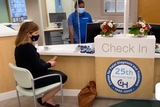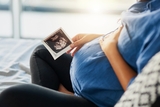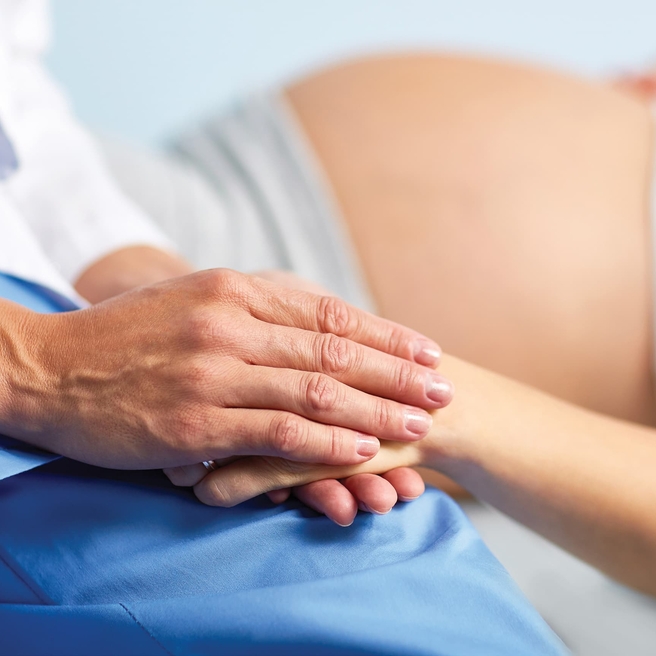Perinatal or postpartum mood and anxiety disorders are typically categorized as one of the following:
Perinatal or postpartum mood disorder
You may have a perinatal or postpartum mood disorder if you have several of the symptoms listed below. These symptoms are intense and they occur daily for longer than two weeks.
Symptoms of a mood disorder include:
- Feeling intense anger or irritability
- Trouble falling asleep or sleeping too much
- Trouble concentrating or remembering things
- Trouble making decisions
- Loss of interest in caring for yourself (such as bathing or dressing)
- Loss of appetite or overeating (often resulting in weight loss or gain)
- Inability to carry out everyday tasks
- Frequent crying spells or feeling teary
- Showing too much or not enough concern for your baby
- Loss of interest in doing things you used to enjoy
- Withdrawing socially from family or friends
- Negative feelings about your baby
- Complete lack of energy
- Feelings of guilt or worthlessness
- Possible thoughts of harming the baby or yourself*
- Seeing or hearing things that aren’t there, or having thoughts that don’t make sense*
If you are experiencing any of these symptoms, please talk to your healthcare provider immediately or call 911 for help right away. This is a medical emergency requiring urgent care.
Perinatal or postpartum anxiety disorder
Anxiety is an emotion that everyone faces at different points in their lives. However, anxiety can be a more serious concern when a feeling of worry, nervousness or unease about a specific event or outcome causes a person such distress that they have difficulty functioning in their daily life.
Approximately 10 percent of pregnant and postpartum women experience significant anxiety symptoms. In fact, research has shown that anxiety symptoms are more common than depressive symptoms during and following pregnancy, but many parents are often unaware that clinical anxiety is what they may be experiencing.
Symptoms of clinical anxiety include:
- Constant worry
- Feeling that something bad is going to happen
- Racing and intrusive thoughts
- Trouble falling asleep or sleeping too much
- Loss of appetite or overeating (weight loss or gain)
- Restlessness or inability to sit still
- Physical symptoms like dizziness, nausea, headaches, racing heartbeat and breathing fast
- Feelings of fear or uneasiness
Perinatal or postpartum psychosis
A very small number of women (one in 1,000) suffer a rare and severe form of a mood disorder called perinatal or postpartum psychosis.
Women who have been diagnosed with a bipolar disorder, schizophrenia or other psychiatric challenges may have a higher risk for developing this form of mood disorder. Women who have experienced perinatal or postpartum psychosis in the past have a 30 percent to 50 percent recurrence risk, so please inform your provider if this is a part of your medical history.
Symptoms of psychosis include:
- Extreme confusion
- Hopelessness
- Inability to sleep (even when exhausted), or excessive energy and not needing to sleep
- Refusing to eat
- Distrusting other people
- Seeing things or hearing voices that are not there*
- Thoughts of hurting yourself, your partner or your baby*
These symptoms are often associated with hormonal changes and can occur in pregnancy, after the time of birth, at the time one stops breastfeeding, or once a woman begins to menstruate in the months that follow birth. Paying particular attention to one’s self-care during these transitional periods and hormonal changes throughout the first year postpartum is of utmost importance to avoid additional symptoms of distress.
If you are experiencing any of these symptoms, please talk to your healthcare provider immediately or call 911 for help right away. This is a medical emergency requiring urgent care.
Perinatal or postpartum obsessive-compulsive disorder (OCD)
Perinatal or postpartum obsessive-compulsive disorder (OCD) is a type of severe anxiety disorder. OCD is an often misunderstood and misdiagnosed disorder that affects as many as 3 percent to 5 percent of new mothers and even some new fathers.
Risk factors for perinatal or postpartum OCD include a personal or family history of anxiety or OCD. More than 38 percent of women with OCD also struggle with an underlying mood disorder.
The repetitive, intrusive images and thoughts common with this condition can be quite frightening and can often present unexpectedly. Research has shown that these images are driven by anxiety and not psychosis. Parents with OCD know that their thoughts are scary or bizarre and, fortunately, they are at a very low risk for acting on them. It is far more likely that the parent with these symptoms takes steps to avoid triggers and stay away from what they fear, which is often a fear of harming one’s baby.
Unfortunately, many women are often embarrassed or ashamed for having these thoughts and feelings and choose to keep them from their partners, family members and medical providers. Please know that you are not alone. You can get help.
Symptoms of OCD include:
- Obsessive, intrusive and upsetting thoughts (often related to the baby)
- Compulsive behaviors in an effort to reduce fears and obsessions (e.g., cleaning, checking, counting, reordering things)
- A sense of horror and/or disgust about the obsessive thoughts
- Fear of being left alone with the baby
- Heightened alertness and preoccupation with protecting the baby
Getting help for a PMAD
Only a trained healthcare or mental health professional can tell you whether you have a perinatal or postpartum mood and anxiety disorder. If you or your loved one continue to have difficulty during this time, it may be helpful for you to contact a mental health professional for additional support. Read more about getting help for a PMAD.

Tour our Fetal Center
The Wood Center for Fetal Diagnosis and Treatment has cared for many families and will help you through your journey, too.

What to expect
From the moment of referral through delivery and postnatal care, your family can expect a supportive experience when you come to us with a diagnosis of a birth defect.
Resources to help
Psychosocial Support in the CFDT and the SDU Resources
All the resources you need to find answers to your questions and support as you cope with the complications of a high-risk pregnancy.
